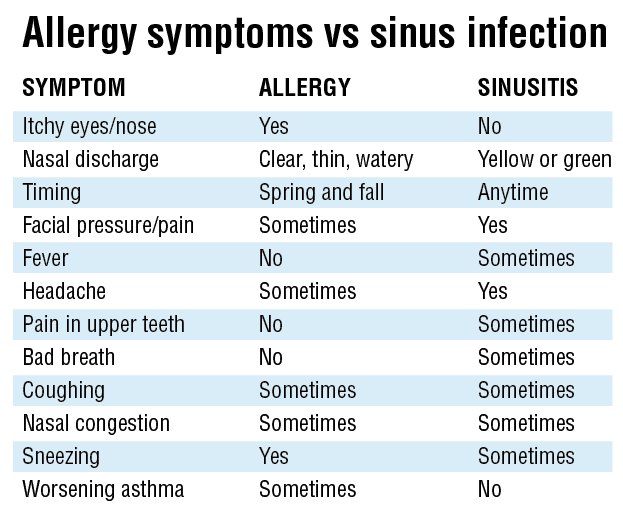
Northern Nevada has seen record levels of precipitation this winter and spring. While all this water is a boon for our rivers, lakes and water table, it has also been a windfall for our allergenic plants.
The upshot: It’s going to be one doozy of an allergy season.
So when you’re faced with a stuffy nose and pounding head in the coming weeks, you can rest assured it’s one of two things: your allergies or a sinus infection.
The fact is, the two conditions have many similarities, causing confusion and leading to inappropriate self-diagnosis and treatment. Thirty-five million Americans suffer from nasal allergies, and seven million suffer from chronic sinus infections — yet many people can’t tell the difference. We’re here to shed some light.
The ins and outs of seasonal allergies
Allergies are the immune system’s reaction to allergic substances in the body. The immune system produces antibodies in reaction to contact with allergens.
Each time the allergens are present, the body creates a series of reactions, including histamine production. Histamine produces common allergy symptoms, such as:
- itchy, watery eyes
- post-nasal drip
- nasal and sinus congestion
- headaches
- sneezing
- scratchy throat
- hives, eczema
- shortness of breath
Allergy treatments
Seasonal allergies can often be controlled with the proper use of medication. Over-the-counter (OTC) drugs can manage allergy symptoms well, including:
- antihistamines
- nasal decongestant sprays
- steroid sprays
- saline sprays
- allergy shots
- immunotherapy
OTC meds are a great option when they work, but they don’t work for everyone, particularly those with severe allergies. In some cases, prescription allergy medicine, immunotherapy, allergy shots or sub-lingual therapy may be recommended. And while antihistamines can be very effective for allergies, they can be counter-productive if you have another condition — sinusitis.
Sinus infections can feel like allergies
A sinus infection, also called sinusitis, is an infection of the sinus cavities caused by bacteria. Normally, mucus collecting in the sinuses drains into the nasal passages, but when you have a cold, allergy attack, or irritation by environmental pollutants, your sinuses become inflamed and are unable to drain. This can lead to congestion and infection. So seasonal allergies can turn into a sinus infection, contributing to the confusion when individuals self-diagnose.
There are several symptoms that both allergy sufferers and those with sinusitis may experience, including headache, nasal congestion, nasal discharge, sneezing and coughing. However, sinus infection has a few hallmark symptoms to look out for:
- mid-facial pain and pressure that worsens when you bend over
- pain in the upper teeth
- yellow or green nasal discharge
- sinus headache
Sinusitis treatment
Bacterial sinusitis requires a physician's diagnosis and treatment with an antibiotic to cure the infection and prevent future complications. To diagnose acute sinusitis, your doctor will do a physical exam and discuss your symptoms. Your doctor also may use x-rays of your sinuses or obtain a sample of your nasal discharge to test for bacteria.
Sinusitis treatment can include:
- antibiotics
- oral steroid
- nasal decongestant/steroid
- surgery for chronic cases
Chronic sinusitis, an infection lasting three months or more or repeating frequently, may have symptoms that are less severe, but more frequent. Untreated chronic sinusitis can cause damage to the sinuses and cheekbones that sometimes requires surgery to repair. Innovative and less invasive in office procedure like Balloon Sinuplasty can provide permanent relief from these symptoms.

The best way to determine if you have seasonal allergies or a sinus infection is to see a board certified otolaryngologist — otherwise known as an ear, nose and throat (ENT) doctor. Our doctors can assess your history and complete an exam to make an appropriate diagnosis and treatment plan. When you get tired of sneezing this spring, turn to Sierra Nevada Ear, Nose & Throat for relief.